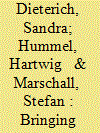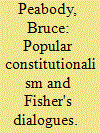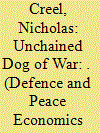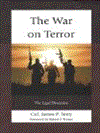|
|
|
Sort Order |
|
|
|
Items / Page
|
|
|
|
|
|
|
| Srl | Item |
| 1 |
ID:
137640


|
|
|
|
|
| Summary/Abstract |
Referring to Kant’s ‘Perpetual Peace’, research on the democratic peace is based on the assumption that citizens’ preferences are fully and directly transferred into actual security policy by democratic leaders. However, democratic responsiveness in foreign politics is a more complex issue. Parliaments are usually key institutions with regard to ensuring responsiveness of democratic leaders both by authorizing political decisions and by monitoring executive policymaking and implementation. However, in several democracies military security policy-making is understood as part of an ‘executive prerogative’. This article examines the role of parliaments in providing for democratic responsiveness of security policy-making. We test the hypothesis that, depending on the extent of their ‘war powers’, parliaments do effectively limit the scope of executive security policy if and when public opinion strongly opposes military action. The decision-making of 25 European democracies on military participation in the 2003 Iraq War serves as a test. Testing the hypothesis we find that countries with strong parliamentary war powers tended to be significantly less involved in the military intervention against Iraq. However, several puzzles of a theory of ‘parliamentary peace’ remain to be addressed by future research.
|
|
|
|
|
|
|
|
|
|
|
|
|
|
|
|
| 2 |
ID:
167543


|
|
|
|
|
| Summary/Abstract |
This article addresses the role of democracy in Australia’s foreign policy formation. It argues that public debate and deliberation on foreign policy is a normative good. When there is a lack of debate on a government decision, a democratic deficit occurs. Such a deficit is evident in the way Australia goes to war; however, the examples of Canada and the UK show that reforming parliamentary practice is possible. In the context of the ‘war on terror’, this article compares Australia, Canada, and the UK from 2001 to 2015 with regards to ‘war powers’. Drawing from debates recorded in Hansard, it finds that while Canada and the UK took steps to ‘parliamentarise’ their foreign policy formation, the war-powers prerogative of the Australian government remained absolute. It concludes that increasing the role of parliament may go a long way towards democratising the decision of when Australia goes to war. This has practical as well as normative benefits, since it may prevent governments from entering wars that are unsupported by the public. At minimum, it will compel governments to engage more thoroughly in public debate about their proposed policies, and justify their decisions to the nation.
|
|
|
|
|
|
|
|
|
|
|
|
|
|
|
|
| 3 |
ID:
120407


|
|
|
|
|
| Publication |
2013.
|
| Summary/Abstract |
During the United States' military strikes in Libya in 2011, the debate over the authority to use force reached levels not experienced in recent American history. Many members of Congress, both Democrat and Republican, expressed concern over what they viewed as a usurpation of Congress's constitutional war powers. These concerns were exacerbated when the Obama administration maintained that it was not engaged in 'hostilities' and that the War Powers Resolution, which was intended to limit the president's war authority, did not apply to this use of force. Yet despite the strong levels of bipartisan constitutional pressure waged against the commander in chief, these efforts were generally discouraged, co-opted or simply opposed by the House and Senate leadership. This research examines the role of Congress's institutional and party leaders, specifically Speaker of the House John Boehner (R-OH), and Senators John Kerry (D-MA) and John McCain (R-AZ), and finds that their leadership was instrumental in keeping Congress's war powers authority subdued, which limited congressional interference in President Obama's military actions in Libya. Understanding these political dynamics is crucial to understanding when and how the world's sole superpower commits to overseas military actions.
|
|
|
|
|
|
|
|
|
|
|
|
|
|
|
|
| 4 |
ID:
126335


|
|
|
|
|
| Publication |
2013.
|
| Summary/Abstract |
As other contributors to this symposium have noted, Louis Fisher has played a major role in shaping debates in such diverse policy battlegrounds as federal budgeting, war powers, and the use of legislative and presidential vetoes. Fisher is also widely (and fairly) credited with spurring interest in "constitutional dialogues"-the "process in which all three branches" along with "the states and the general public" offer separate, competing, and sometimes complementary visions of the Constitution and the values it embodies (Fisher 1988, 3).
|
|
|
|
|
|
|
|
|
|
|
|
|
|
|
|
| 5 |
ID:
181634


|
|
|
|
|
| Summary/Abstract |
Military power relies upon military capabilities, generated by organisations, infrastructure, and defence establishments. This paper highlights the importance of remote warfare to research on the transformation of military power in the contemporary world. It draws attention to the relationship between military capabilities that enable states to intervene in physically distant conflicts and their political legitimacy. It argues that remote warfare is best understood as a family resemblance of legitimacy problems associated with military capabilities, rather than a category of warfare, set of tactics, or strategy. It then identifies a framework for understanding the varied types of legitimacy problems associated with remote warfare: remote warfare consists of a set of problems that examine how military capabilities affect the ability of states to act without violating international norms, governments to act without violating domestic constraints, the ability of governments to control their exposure to interventions at distance, and their ability to avoid responsibility for the consequences. The importance of this approach is highlighted by the way that it helps to explain the importance of controversies over military infrastructure used to support interventions and therefore highlights the importance of work on remote warfare for the wider study of military transformation and military power.
|
|
|
|
|
|
|
|
|
|
|
|
|
|
|
|
| 6 |
ID:
189449


|
|
|
|
|
| Summary/Abstract |
Research on the constraint President’s face in matters of foreign policy is generally of the view that they are largely free to do as they please. Some research however posits that Congressional constrain on the executive is in fact much larger than it is given credit for. Using their research as a jumping off point, I re-examine this matter by asking when the President will seek ex ante Congressional authorization for the use of force. I estimate this potential effect of Congressional constraint on the President by looking at US initiated militarized interstate disputes with at least one fatality. In so doing, it is demonstrated that no Congressional constrain exists in this regard; the President rarely seeks ex ante authorization for the use of force and is therefore not truly constrained in its use. In fact, evidence is brought to bear that if anything the diversionary theory of war initiation may hold water; inflation is shown herein to be negatively linked to ex ante Congressional authorization for the use of force. It seems as though the President is less likely to ask Congress for permission to conduct deadly military operations when inflation is high.
|
|
|
|
|
|
|
|
|
|
|
|
|
|
|
|
| 7 |
ID:
135616


|
|
|
|
|
| Publication |
New Delhi, Pentagon Press, 2014.
|
| Description |
xiv, 241p.Hbk
|
| Standard Number |
9788182747913
|
|
|
|
|
|
|
|
|
|
|
|
Copies: C:1/I:0,R:0,Q:0
Circulation
| Accession# | Call# | Current Location | Status | Policy | Location |
| 058057 | 363.32/TER 058057 | Main | On Shelf | General | |
|
|
|
|
|
|
|
|
|